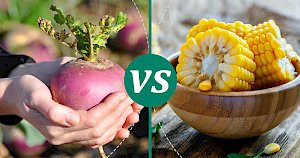Corn vs Turnip: Nutrition, Calories & Protein Compared


Corn vs Turnip
Nutrition Facts
Serving size:
change
5g10g15g20g30g40g50g60g80g100g120g140g160g180g200g220g250g300g350g400g450g500g600g700g800g900g1000g
1oz2oz3oz4oz5oz6oz7oz8oz10oz12oz15oz20oz25oz30oz35oz40oz50oz
Amount Per Serving:
Serving size:
change
5g10g15g20g30g40g50g60g80g100g120g140g160g180g200g220g250g300g350g400g450g500g600g700g800g900g1000g
1oz2oz3oz4oz5oz6oz7oz8oz10oz12oz15oz20oz25oz30oz35oz40oz50oz
Amount Per Serving:
Corn vs Turnip 100g Compare
| per 100g | Corn | Turnip |
|---|---|---|
| Calories | 86 | 28 |
| Carbohydrates | 14.69 g | 6.43 g |
| Fat | 1.63 g | 0.1 g |
| Dietary fiber | 2.43 g | 1.8 g |
| Protein | 2.79 g | 0.9 g |
| Calcium | 0.656 mg | 30 mg |
| Iron | 0.388 mg | 0.3 mg |
| Magnessium | 25.76 mg | 11 mg |
| Potassium | 237 mg | 233 mg |
| Zink | 2.513 mg | 0.27 mg |
| Vitaminium B1 (Thiamine) | 0.079 mg | 0.04 mg |
| Vitaminium B2 (riboflavin) | 0.138 mg | 0.03 mg |
| Vitaminium B3 (Niacin) | 1.593 mg | 0.4 mg |
| Vitaminium B5 | 0.717 mg | 0.2 mg |
| Vitaminium B6 | 0.15 mg | 0.09 mg |
| Vitaminium B9 (Folic acid) | 42 mg | 15 mg |
| Vitaminium C | 6.8 mg | 21 mg |
| Vitaminium E | 0.07 mg | 0.03 mg |
| Vitaminium K | 0.3 µg | 0.1 µg |
Exploring the Nutritional Landscape: Corn and Turnip
When it comes to choosing vegetables for a balanced diet, the variety on offer can be both exciting and a bit overwhelming. Two staples that often come up in nutritional conversations are corn and turnip. While one is a classic favorite during the summer months, the other is a root vegetable often associated with hearty winter meals. But beyond their seasonal appeal, how do these two compare in terms of nutrition?
A Closer Look at Corn and Turnip
Before diving into the numbers, let's appreciate the rich history and versatility of these vegetables. Corn, also known as maize, has been a fundamental crop in the Americas for thousands of years. It's not just a side dish at your barbecue; it's a staple grain for many cultures worldwide. On the other hand, the turnip is a root vegetable with a peppery flavor that has been cultivated for centuries. It can be eaten raw, cooked, or even fermented, making it a versatile ingredient in many culinary traditions.
Nutritional Breakdown: The Facts
When comparing the nutritional content of corn and turnip, it's important to note that both vegetables offer unique benefits. Here's a simplified breakdown based on a 100g serving of each:
- Calories: Corn comes in at 86 calories, while turnip has just 28.
- Carbohydrates: Corn has 18.7g of carbs, significantly higher than turnip's 6.43g.
- Fiber: Both vegetables are relatively close in fiber content, with corn at 2g and turnip at 1.8g.
- Fat: Corn contains more fat at 1.35g, compared to turnip's minimal 0.1g.
- Protein: Corn offers more protein with 3.27g, while turnip provides 0.9g.
- Vitamins and Minerals: Turnip outshines corn in vitamin C and calcium content, whereas corn offers more in terms of vitamin A and B vitamins.
It's clear from these figures that corn is more calorie-dense, making it a good energy source, while turnip is a low-calorie option packed with vitamin C and calcium.
What Does This Mean for Your Diet?
Choosing between corn and turnip depends on your dietary needs and preferences. If you're looking for a low-calorie option rich in vitamins, turnips might be the way to go. They're especially great for adding bulk to your meals without significantly increasing your calorie intake. Corn, with its higher carbohydrate and protein content, can be an excellent source of energy for those with higher caloric needs.
However, it's not just about the numbers. Both vegetables are valuable additions to a balanced diet, offering different flavors, textures, and nutritional benefits. Whether you're enjoying corn on the cob during a summer picnic or savoring a warm turnip stew in the winter, you're nourishing your body with essential nutrients.
Conclusion
In the end, the choice between corn and turnip doesn't have to be a nutritional showdown. Instead, it's an opportunity to appreciate the diversity of vegetables available and how they can contribute to a varied, balanced diet. By understanding the nutritional content and health benefits of each, you can make informed decisions that suit your dietary needs and preferences, ensuring a colorful and nutritious plate at every meal.
Corn 100g
86kcalCalories source
- 69% CARBS.
- 13% PROTEIN
- 17% FAT
100g | ounce | single piece | tablespoon | teaspoon | cup | half cup | small can | medium can
Turnip 100g
28kcalCalories source
- 85% CARBS
- 12% PROTEIN
- 3% FAT
Compares of corn
- Corn vs Asparagus
- Corn vs Bamboo Shoots
- Corn vs Beetroot
- Corn vs Broccoli
- Corn vs Brussels Sprouts
- Corn vs Butternut Squash
- see all compares of corn
Marcin Piotrowicz
calories-info.com creator
Healthy diet and healthy lifestyle promoter
Add comment